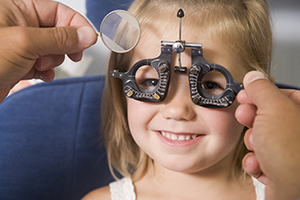When can we test a baby's eyes?
We're happy to see your baby from birth. Any dramatic conditions should be picked up by NHS screening. Therefore, it's usually sensible to wait until at least 6 months old. If you have concerns about your child's vision or a potential eye sight problem, please come and see us.
Vision Problems: Early Signs
Children at this age often don’t know to complain about vision problems, so it’s extra important for parents to monitor the warning signs of an eye condition.
Things to look out for are:
- Sitting very close to the TV
- Holding books very close
- Squinting a lot
- Tilting the head
- Frequent rubbing of the eyes
- Short attention span when observing things
- Frequently going cross-eyed
- Sensitivity to light
- General difficulty with hand-eye coordination during sports
- General avoiding of colouring activities, puzzles and other activities that require close visual attention.


Vision Screening and Eye Examinations - There’s a Difference
When your child reaches the age of 3, you should book a thorough eye examination to ensure all is developing accordingly. At Lynne Fernandes, we recognise the importance of detecting any problems early on, which is why we offer free NHS sight tests to all children.
After this test and unless instructed otherwise, you should schedule your child’s next eye examination for about 5 years of age - this way, your optometrist can monitor how your child’s vision is developing and if there will be a potential eye sight problem.
If your child’s school implements a vision screening policy, it’s important to realise that this does not equate to a comprehensive eye examination conducted by a qualified optometrist.
School Visits
We offer all primary schools local to our practices the opportunity to arrange a school trip: it's so popular we've received awards from pupils saying it has been their best trip of the year!
A class of 30 can be split into 4 groups for a visit. They then rotate around:
- Learning about an eye examination: what to expect
- Interesting eye facts
- Seeing how spectacles are made and feeling contact lenses
- Trying on glasses
Children (and teachers!) love this visit. It is a great learning experience and after the visit, they are far more relaxed about having an eye examination and wearing spectacles if they are needed.
If you are a teacher or parent and you would like to find out more, please contact Lynne Fernandes Optometrists today.